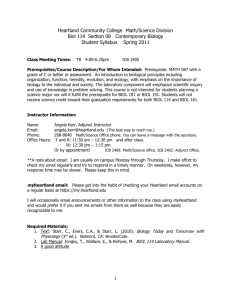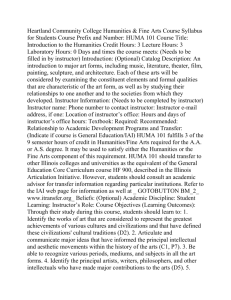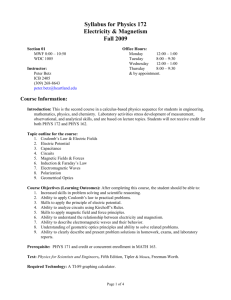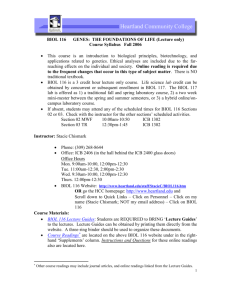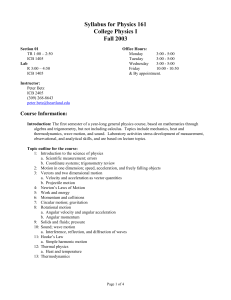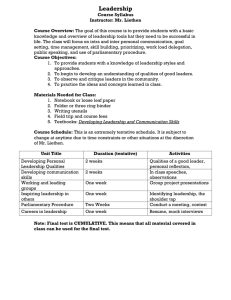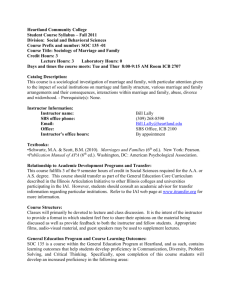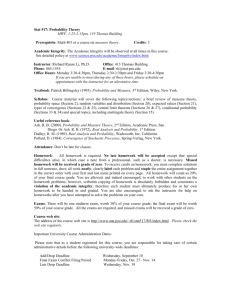BIOL 121-01 - Jane Chapman
advertisement
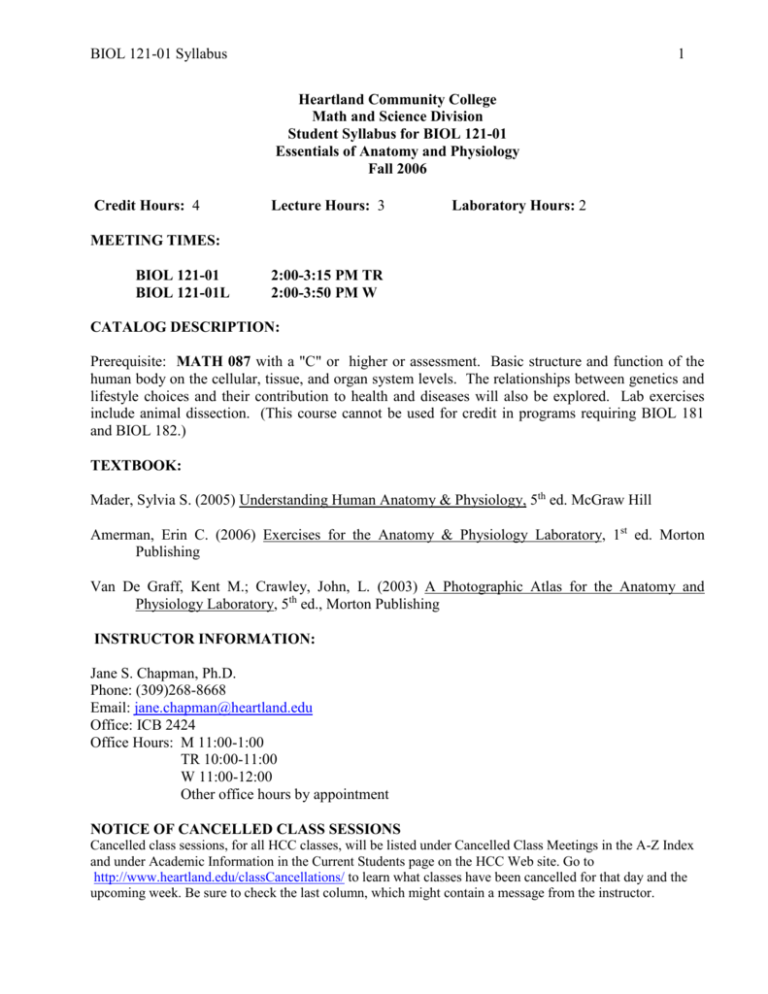
BIOL 121-01 Syllabus 1 Heartland Community College Math and Science Division Student Syllabus for BIOL 121-01 Essentials of Anatomy and Physiology Fall 2006 Credit Hours: 4 Lecture Hours: 3 Laboratory Hours: 2 MEETING TIMES: BIOL 121-01 BIOL 121-01L 2:00-3:15 PM TR 2:00-3:50 PM W CATALOG DESCRIPTION: Prerequisite: MATH 087 with a "C" or higher or assessment. Basic structure and function of the human body on the cellular, tissue, and organ system levels. The relationships between genetics and lifestyle choices and their contribution to health and diseases will also be explored. Lab exercises include animal dissection. (This course cannot be used for credit in programs requiring BIOL 181 and BIOL 182.) TEXTBOOK: Mader, Sylvia S. (2005) Understanding Human Anatomy & Physiology, 5th ed. McGraw Hill Amerman, Erin C. (2006) Exercises for the Anatomy & Physiology Laboratory, 1st ed. Morton Publishing Van De Graff, Kent M.; Crawley, John, L. (2003) A Photographic Atlas for the Anatomy and Physiology Laboratory, 5th ed., Morton Publishing INSTRUCTOR INFORMATION: Jane S. Chapman, Ph.D. Phone: (309)268-8668 Email: jane.chapman@heartland.edu Office: ICB 2424 Office Hours: M 11:00-1:00 TR 10:00-11:00 W 11:00-12:00 Other office hours by appointment NOTICE OF CANCELLED CLASS SESSIONS Cancelled class sessions, for all HCC classes, will be listed under Cancelled Class Meetings in the A-Z Index and under Academic Information in the Current Students page on the HCC Web site. Go to http://www.heartland.edu/classCancellations/ to learn what classes have been cancelled for that day and the upcoming week. Be sure to check the last column, which might contain a message from the instructor. BIOL 121-01 Syllabus 2 RELATIONSHIP TO ACADEMIC DEVELOPMENT PROGRAMS AND TRANSFERABILITY: BIOL 121 is a one semester course designed for students wishing a survey of human anatomy and physiology. It counts as a laboratory course in the life sciences and fulfils 4 of the credits required for the A.A. degree and as part of the Core Curriculum described in the Illinois Articulation Initiative. It is also recommended for those students needing a one semester anatomy and physiology course for certain certificate programs in allied health occupations. Students in nursing and other programs needing a two semester anatomy and physiology sequence should not take this course. Students should consult an academic advisor for transfer information regarding particular institutions and programs. Refer to the IAI web page for information as well at www.itransfer.org COURSE OBJECTIVES (Learning Outcomes) 1. To gain knowledge of the structures making up the human body on the cellular, tissue, and organ system levels. 2. To understand the relationship of structure to function in the human body. 3. To gain knowledge of certain diseases and their relationship to abnormalities in structure and function. 4. To understand the influence of genetics on function of the human body both in health and disease. 5. To understand the basic principles of maintaining a healthy body, and prevention of disease through nutritional and other lifestyle choices. 6. To understand the ways that health issues are related to global medical, environmental and bioethical issues. (D5) 7. To demonstrate an understanding of the methods of science and their application to medical research and corresponding technology (PS2). 8. To demonstrate the ability to comprehend articles written by health professionals. (C7) COURSE/LAB OUTLINE: 1. Introduction to the nature of science, technology, and bioethical issues relating to human health and disease. 2. Basic biological chemistry and nutrition. 3. Cells and Tissues 4. Anatomy and Physiology of the major organ systems of the human body 5. Reproduction, development, and aging of the human body 6. Principles of Genetics applicable to human form, function, and disease BIOL 121-01 Syllabus 3 DESCRIPTION OF INSTRUCTIONAL TECHNIQUES AND RATIONALE: Instruction will take the form of lecture, discussion, and lab work. Lectures and labs will make extensive use of visual aids and models to aid student learning. While some overlap will naturally occur, lectures will primarily focus on physiology, while labs will be concerned with anatomical terminology and identification of structures. DESCRIPTION OF LEARNING FORMAT: Student Responsibilities: Students must take responsibility for their own learning. Part of that responsibility is attendance and active participation in all lecture and lab sessions. Taking notes during lecture, asking pertinent questions, and completion of written lab reports, when required are a part of that participation. The student must read the assigned readings and spend enough time in independent study to master the material. If the student is having difficulty with a particular topic it is his or her responsibility to ask questions or consult with the teacher to gain additional help in that topic. It is the student’s responsibility to put in the necessary time to do well in this class. It is recommended that that students put in 2-3 hours of outside work for every hour the students spends in class. The following activities will help you in learning the material and be successful in the class: 1. Be on time and attend all lectures on the current topic. 2. Take thorough notes during lecture and lab. 3. Study the required textbook pages and anatomical diagrams. 4. Be on time and attend all labs and complete any lab assignments that are given. 5. Review material for lecture and lab tests (see note above) 6. Take lecture and lab tests as scheduled. 7. Review the corrected tests in class after they are returned, using the opportunity to more perfectly master the material. 8. Avoid any disruptive or abusive behavior 9. Be courteous and respectful to classmates as well as the instructor Instructor Responsibilities: The instructor is responsible to provide an environment for learning that will not only stimulate intellectual curiosity but motivate students to their best. The role of instructor is to lecture, facilitate discussion, clarify reading material, and be available for any questions that students might have. The Instructor will: 1. Be on time and prepared for each class meeting 2. Be helpful, courteous and respectful to the students 3. Prepare fair exams that allow students to demonstrate their knowledge of the course material 4. Grade all course materials in a timely fashion and review them when possible 5. Provide office hours for the student to discuss their progress in the course 6. Provide course progress reports for the students 7. Protect the confidentiality of the students’ progress BIOL 121-01 Syllabus 4 METHOD OF EVALUATION (Tests/Exams, Grading System): The final grade will be based on the following percentages: 75% of the final grade will be based on the lecture percentage 25% of the final grade will be based on the lab percentage Lecture Percentage: The lecture grade will be based on five unit exams. Unit exams may combine objective, short answer, and essay type questions. In the rare instances when the student misses an exam due to documented illness or emergency, and he or she makes arrangements with the instructor before or on the day of the exam, he or she may take an exam prior to the next class meeting. NO MAKE-UP EXAMS WILL BE GIVEN. If the student knows ahead of time that he or she will not be able to take an exam on a certain date the student must inform the instructor no less than 48 hours before the exam date to make arrangements with the instructor to take the exam prior to the next class meeting. The college has a testing center in the ASC, for make up tests. Students will need to show a photo id to take the test. Tips on studying for exams: 1. After every class period, go over your notes for 15-30min. to make sure that you understand everything. Don’t simply memorize but try to recognize the importance of the concept. If you don’t understand something, ask the instructor the next class period, call the instructor or e-mail the instructor. **Students learn 10% of what they read, 20% of what they hear, 30% of what they see, 50% of what they see and hear, 70% of what they discuss, 80% of what they experience, and 95% of what they teach to someone else.** If you can teach someone else the material learned, you will be ready for the exam. 2. Read the corresponding pages in the textbook to reinforce your understanding. 3. NEVER study for the entire exam the night before! We will cover too much information for the student to study the night before an exam. 4. Go to the instructor during office hours for extra help or arrange for another appropriate time to see the instructor. 5. Academic Support Services can set up a tutor, if necessary. Lab Percentage: The lab grade counts as 1/4 of the entire grade. The lab percentage will be based on points earned on two lab exams. While lab exercises will not be graded, information covered in the lab exercises will be covered on the lecture unit exams. GRADING The following is taken from the HCC Catalog and Student Handbook (p.168). Heartland Community College - Philosophy of Grades The Heartland Community College grading philosophy grows out of our vision of educational excellence. This common philosophy provides a framework for each academic division and instructor as they establish their own individual course grading system, evaluation methods, and course policies using the shared general rubrics for letter grades given below. BIOL 121-01 Syllabus 5 Letter grades serve as a vehicle to promote meaningful evaluation of student achievement, to inform students of academic progress, and, as necessary, to improve student performance, habits, and practices. Using a letter grade as a prerequisite for subsequent courses means we believe that the grade was assigned through a conscious judgment about a student's readiness to proceed to more advanced study. At Heartland, students' academic achievement is measured by their mastery of course objectives and content. We challenge students to meet these recognized standards of achievement and we assign grades based on their success in doing so. Simply stated, we believe that the responsibility for academic achievement rests with the student and that holding students responsible for their learning promotes their academic growth. Letter Grade Category A (4.0) This grade represents consistently outstanding performance that demonstrates superior understanding and skillful use of important course concepts. Performance at this level signifies that the student is extremely well prepared to continue with more advanced study of the subject. B (3.0) This grade represents performance significantly beyond the level necessary to achieve the course objectives. Work is of high quality but not consistently at an outstanding level. Performance at this level signifies that the student is well prepared to continue with more advanced study of the subject. C (2.0) This grade represents an acceptable achievement of the course objectives. Performance at this level signifies that the student is reasonably well prepared to continue with more advanced study of the subject. D (1.0) This grade represents less than adequate performance. It signifies questionable readiness to proceed with more advanced study of the subject. F (0.0) This grade reflects unacceptable performance. The student is not yet ready to proceed with more advanced study of the subject, and must repeat the course successfully to receive credit. POLICIES ON PARTICIPATION AND ATTENDANCE: (1) Students are expected to participate in lecture by taking notes, asking questions, and entering into discussion. As a courtesy, student should take care not to disrupt the class or distract the teacher with inappropriate behavior, students who do will be asked to leave. Please turn off all mobile phones, pagers etc. (2) Though attendance will not be formally taken, and participation points are not given formally, both attendance and participation will be considered when calculating the final grade. Students are responsible for any missed class material and/or possible assignments. November 8, 2006 is the official HCC withdrawal deadline. If you have not withdrawn by that date, excessive absences may result in an "F" for the course. MAKE-UP POLICIES: There are no make-up exams. See above section “Lecture Percentage”. If the student knows ahead of time that he or she will not be able to take the exam on a certain date, please let the instructor know no fewer than 48 hours of the exam date so that other arrangements can be made for taking the exam before the next class. Please be aware that if you arrive late on exam day, you will not be given any extra time to finish the exam. REQUIRED WRITING AND READING: Students are expected to read textbook chapters and complete the workbook, which includes labeling BIOL 121-01 Syllabus 6 anatomical diagrams and study questions. Students will also read supplemental articles as assigned by the instructor based on related news Student Conduct: Once again, as a courtesy, students should take care not to disrupt the class or distract the teacher with inappropriate behavior, students who do so will be asked to leave. Noisy or messy food should not be brought to lecture. Only covered drinks will be allowed. To comply with health regulations no food should be consumed in the lab. Please dispose of any trash when you leave. ACADEMIC INTEGRITY & PLAGIARISM: The Heartland Community College policies on academic integrity and/or plagiarism from HCC syllabus guidelines are quoted below. In this course violations of the policy will automatically result in a “0" on the assignment and may result in an F for the course. Academic Integrity Academic integrity is a fundamental principle of collegial life at Heartland Community College and is essential to the credibility of the College’s educational programs. Moreover, because grading may be competitive, students who misrepresent their academic work violate the right of their fellow students. The College, therefore, views any act of academic dishonest as a serious offense requiring disciplinary measures, including course failure, suspension, and even expulsion from the College. In addition, an act of academic dishonesty may have unforeseen effects far beyond any officially imposed penalties. Violations of academic integrity include, but are not limited to cheating, aiding or suborning cheating or other acts of academic dishonesty, plagiarism, misrepresentation of data, falsification of academic records or documents and unauthorized access to computerized academic or administrative records or systems. Definitions of these violations may be found in the college catalog. Plagiarism: Plagiarism is the presenting of others’ ideas as if they were your own. When you write a paper, create a project, do a presentation or create anything original, it is assumed that all the work, except for that which is attributed to another author or creator, is your own. Plagiarism is considered a serious academic offense and may take the following forms: Copying word-for-word from another source and not giving that source credit. Paraphrasing the work of another and not giving that source credit. Adopting a particularly apt phrase as your own. Using an image or a copy of an image without crediting its source. Paraphrasing someone else’s line of thinking in the development of a topic as if it were your own. Receiving excessive help from a friend or elsewhere, or using another project as if it were your own. [Adapted from the Modern Language Association’s MLA Handbook for Writers of Research Papers. New York: MLA, 1995: 26] Note that word-for-word copying is not the only form of plagiarism. The penalties for plagiarism may be severe, ranging from failure on the particular piece of work, failure in the BIOL 121-01 Syllabus 7 course or expulsion from school in extreme cases. SUPPORT SERVICES: Heartland Library Information The Library, located in the Students Commons Buildings (SCB) at the Raab Road campus, provides Heartland students with a full range of resources including books, online journal databases, videos, newspapers, periodicals, reserves, and interlibrary loan. Librarians are available to assist in locating information. For more information please call the Library (309) 268-8200 or (309) 268-8292 Tutoring Center Heartland Community College offers tutoring in various forms at no cost to Heartland students at the Academic Support Center (ASC) in Normal and at the Pontiac and Lincoln Centers. Tutors are available at convenient times throughout the week. Study groups, group tutoring facilitated by a specially-trained tutor, are also available by request. For more information about services available at each location, please call the ASC in Normal (309) 268-8231; the Pontiac Center (815) 842-6777; the Lincoln Center (217) 735-1731. Testing Center The Testing Center provides a quiet environment for students to complete make-up exams, online exams, and exams for students with special accommodations. Students may be able to complete exams in the Testing Center if arrangements are made with their instructor. For more information, contact the Testing Center at (309) 268-8231.
